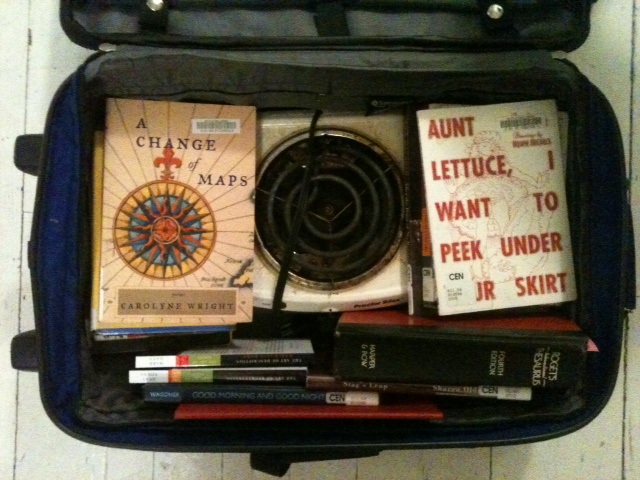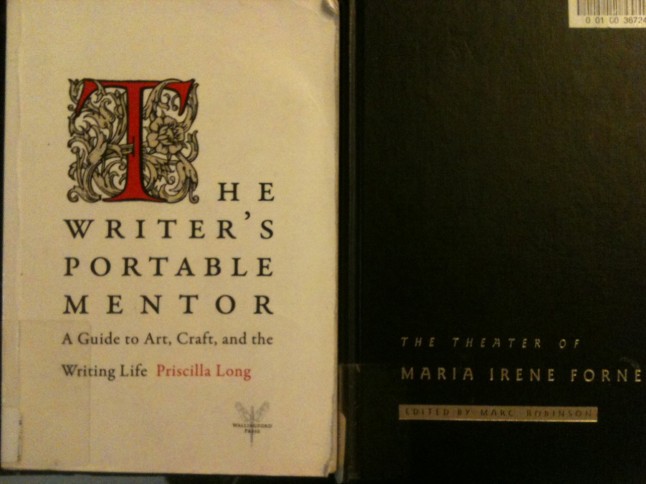Well, at least if I need warmth, I can burn some books.
act of writing
On Procrastination and Discovery
Despite the luxury of twofold renewal (totaling a span of 9 weeks!), today I found these two books unmistakably due. With no reprieve in sight I did what any laggard bookworm would do – I opened them!
Priscilla Long’s The Writer’s Portable Mentor, A Guide to Art, Craft, and the Writing Life, is a practical gem. In Part I, she urges aspiring writers to write every day without fail for 15 minutes; the value of staying in touch with one’s writerly obsessions is priceless. One can use daily exercise to work on sense observation, or to start on a draft. I liked her tips such as labeling journal entries for future gleanings, and making a point to type out a handwritten draft right away for potential revision. How often do superb first-takes languish between the pages of a journal until some impossibly late date? She also champions a healthy balance between free writing and writing into a specific structure to create a finished piece. She promises that in the course of her book, she will help the aspiring writer develop a strategy to find structures for his or her work.
In my other neglected tome, The Theater of Maria Irene Fornes, edited by Marc Robinson, the first essay opens with a story of Irene and her roommate Susan. The girls are at a cafe in Greenwich Village in Spring of 1961. They plan to hang around and see if anyone invites them to a party. Then Susan discloses that she is bummed because she hasn’t been able to start on the book she wants to write. Irene says, you just need to sit down and start writing! Then, determined to encourage her friend, she turns down a party invitation and insists they go back to their apartment and commence writing. The procrastinating writer is no other than Susan Sontag and her helpful friend, Maria Irene Fornes, changes course that afternoon from painting to playwriting. “I might never have even thought of writing if I hadn’t pretended I was going to show Susan how easy it was.”
Even if I don’t make it past the first essay in either of these books, my take-away is huge. The secret of becoming and remaining a writer is spelled out as clear as day. Write! I wonder what else lies in wait for me to discover in the final moments as my time for exploration runs out?
Spotlight: Sarah Ruhl’s 100 essays I don’t have time to write
I’m up before dawn, on a Sunday! The milk for my tea is hovering just this side of sour & it’s starting to clot before my bleary eyes. Nonetheless, I have to run to my desk, now, to write a review of Sarah Ruhl’s 100 essays I don’t have time to write on umbrellas and sword fights, parades and dogs, fire alarms, children and theater. Because I love this book! It contains so much that is of value! Sarah Ruhl reminds us that art comes from life – messy, imperfect life- and that we humans screw things up with our uber-seriousness. “Where are the jugglers? The fire-eaters?” she asks. Refusing to idealize or disparage motherhood, she aligns it with the primary urge to make theater, and claims that both require the DIY ability of turning junk into treasure.
Sarah Ruhl packs so much hilarity and profundity in her prose. In essay #35, just 25 words in to it she has restored our creative potential; stating what comes naturally to 5 year olds, and Shakespeare – “By speaking it [a palace, the woods, an evil tower], we make it so.”
Notwithstanding her playful tone, Sarah Ruhl touches upon various isms.
Sexism – “A male artist following his whims is daring, manly, and original. A woman artist following her whims is womanly, capricious, and trivial.” #61
Racism – “Color-blind casting; or, why are there so many white people on stage?” #41
Elitism – “Do we all need a master’s degree to put up a play? Whatever happened to the garage, to the basement?” #38
Ageism – “Botox has become our new version of the Greek mask.” #29
Celebrity worship – “Everyone is famous in a parade.” #36
Technology fixation – “If waiting is lost, then will all the unconscious processes that take place during waiting get lost? And then might we see the death of the unconscious, and the death of culture?” #72
Her nuggets are the sort of pearls one scribbles on the back of a napkin (or, in my case, index cards); not precious, scooped from the chaos of life. For me, the message I treasure is to plunge more madly into the mess. “More failure! More demand for failure! More bad plays! Less perfection! More ugliness! More grace!” she belts in essay #56, as if she is competing with a jackhammer and a wired toddler (or both).
I still have 22 essays to go in the book, but I had to pen this review without delay! It couldn’t wait! I want to savor the remaining essays, and, besides, when I do finish, I’ll probably start it over at the beginning.
Temperature gradations
This morning, at my desk, it is just a shade chilly, so that a light sweater is fetched. The silver keypad emits a crispness that rubs off onto my fingertips. A teacup nearby is a receptacle for brown liquid which slurped readily warms the throat and gullet. But outside on the porch, it is blazingly hot, inviting one to relax and bask in the sun’s rays, like a dazed vacationer.


